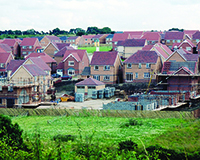 Delivering sustainable large-scale development is far from easy.
Delivering sustainable large-scale development is far from easy.
In the old days, people said that “land, finance and will” were enough. Not any more. But as acceptance of the national housing problem and the need to act grows, we are another step closer to the solution.
The government is trying to do its bit. “We are the builders,” it said. But it could equally have said “we are the tinkerers”, as what has followed has been much tweaking and poking at the planning system. Because, of course, it is the market that actually builds. The government can only provide the framework and the incentives.
How can we achieve a functional planning and development process that genuinely delivers? For me, it comes down to a set of vital ingredients.
Trust is the most important – the glue that holds everything together – but certainty is the foundation stone. Providing much-needed development through the planning system is often about managing risk. What we need is a degree of confidence that the time, effort and investment required will lead to a successful outcome. People, communities and the development industry need to have trust in the planning process.
From Whitehall to the Shires, nothing gets done without clear political leadership and will. Elected representatives can do more to shape, direct and contribute to the quality of what is built in their areas. Solving the housing crisis is not a market problem, it is a collective responsibility.
Delivering large-scale development demands a level of commitment that is not needed for smaller sites, so collaboration is critical. Big projects take longer and more is at risk. Schemes succeed when all the people involved work together, recognise that everyone has a stake and do not try to stitch the other side up.
I always encourage people to deal with the difficult things up front. “What is this development going to do for us?” is a common response when an idea for 3,000 new homes is put on the table. “It will wreck the character of our town and burden our already stretched services” is another. Tackling the big things – infrastructure, schools, health, and how and when they are to be delivered – is vital. At Barton Willmore, we have worked on projects where we have defined a community infrastructure pot from the start, rather than fight over it later.
It is common sense not to move the goalposts, but common sense doesn’t always prevail. Sure, being adaptable is part of effective planning, but everything that is done well is based on clear objectives. Define those aims and keep them in mind throughout the project.
Assemble the right team for the job. It takes skill, experience and technical expertise to build trust and deal with complex issues. Recognise what is needed and don’t delay confronting it. It is hard to finish the race if the novice driver has already shredded the tyres.
Patience is even more of a virtue when delivering large-scale development. Set realistic expectations for your return on investment. With cash flow often vital in order to recoup up-front infrastructure costs, don’t chase quick returns by compromising on quality. What you build and occupy in phase one sets the tone and establishes your reputation.
It is essential to recognise that progress is not a straight line. There will be big bumps in the road and challenges are inevitable, so work together to overcome setbacks. Concentrate on mutual gain from mutual problem solving.
Finally, focus on the right things. On a large project, each partner is ultimately serving a different master, so maintaining clarity on what is important ensures you build credibility, momentum and then success. Keep an eye on the common goals. Invest in the future of the place, put in the park first and don’t cut corners. Do this and you will improve both the outcome and the financial return.
Easy schemes and opportunities are no more. Delivering – and delivering quality – is far from straightforward. But with these ingredients, I am confident that we will continue to see success far more than failure. As an urban planner, that is what motivates me. If we as a development community collectively embrace these principles of effective, large-scale placemaking, perhaps we will be seen as urban heroes – like so many that have gone before us.
Robin Shepherd is partner at Barton Willmore











